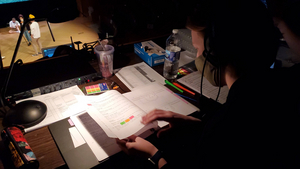BWW Blog: What It's Like To Be a (First-Time) Student Stage Manager During COVID-19
There’s a first time for everything…but that first time isn’t the same for everybody.

In 2017, I came to Butler University with the idea that I was going to be an actor. To make an incredibly long story (that will be broken up into future blog posts) short, I won't be leaving as an actor. I discovered that I wanted to try everything humanly possible in the theatre before I graduated. This year, one of the final items I had to tick off my list was one of great importance to a production: stage management.
In October of 2020, Butler University successfully staged a production of "Lafcadio, The Lion Who Shot Back," an adaptation of the classic Shel Silverstein book, directed by Elaina Artemiev and stage managed by yours truly. I secured this position loooong before COVID was an issue that closed down universities and performing arts programs across the nation. So, imagine my surprise when my production was rescheduled to open TWO MONTHS EARLIER than its original date under the stipulation that actors had to remain 6 feet apart on stage AT ALL TIMES. What was I getting myself into!? Well, now that I've had ample time to reflect on this experience, I can tell you exactly what I got myself into.
-
Zoomed production meetings: Yes, you heard right-Zoom had infiltrated our rehearsal process! While it was nice to set an alarm for 8:29am and still be on time, I truly missed out on the experience of running a production in-person. It's difficult to get a read on designers' and directors' thoughts from the nine-by-nine grid on my laptop. Plus, I felt like it was easier to let notes slip through the cracks and hold people accountable to their deadlines. Yet...the convenience factor outweighed the minimal cons, leading me to believe digital production meetings to be the wave of the future for college kids and instructors.
-
Carefully monitored rehearsals: At Butler, we operate all of our productions according to Actor's Equity Rules, not only for sanity's sake but to bring an added level of professionalism to our productions. We use the same breaking procedure, where every 55 minutes of work calls for a 5-minute break, and every 80 minutes calls for 10. However, due to the number of ACH (air changes per hour) in our given rehearsal spaces, we were required to take a 5-minute break for ever 30 minutes of rehearsal with our full cast. We had to fully vacate the building and take our breaks outside to let the HVAC catch up and vacate the potentially contaminated air from the space. This meant while I was watching my script, by Q Lab files, and generating blocking notes, I was watching the clock like a hawk. My director was not exactly pleased with this protocol, but I felt a great level of responsibility for keeping my peers safe.
-
A strict sanitizing regimen: Speaking of safety, sanitizing became a big concern for production management and our stage management team at Butler. With the way our cast staged "Lafcadio," the storytelling relied heavily on props as opposed to the movement of set pieces. When the actors were portraying lions in the jungle, they were merely holding blades of grass. Costumes were also a huge factor in storytelling, meaning quick changes were happening on stage and costumes were ending up *on the floor*. For actors, that meant the age-old rule of "don't touch a prop if it's not yours!!!!!" was doubly enforced. For the SM team, that meant every rehearsal was lengthened by a sanitizing routine: wipe down every single prop with Lysol wipes, store each actors' costume pieces in their own garment bag, sweep and mop the floor at the end of every rehearsal, and sanitize any high-contact point of the rehearsal space. My hands have never been cleaner than they were in those six weeks.
-
Live-streaming logistics: Because our department and our director adapted "Lafcadio" from the ground up, there were no issues with obtaining rights from MTI or Dramatists Play Service. Yayy!! Not only does this mean we got to put on a creative and professional production without paying to play, but without paying to livestream. The theatre department at Butler University runs all of its public productions through Butler Arts and Events Center, the presenting organization on our campus. By partnering with BAEC on this production's livestream, over 100 additional friends, families, and community members got to enjoy "Lafcadio" from the safety of their own home. While the appeal of life theatre is that it is happening right in front of you, it is spectacular that theatres can reach a deeper audience with their streaming capabilities, especially on an academic level.
From the moment we had our first table read to the moment the lights went down at our last performance, I had an absolute blast stage managing this production. Stage managing "Lafcadio, The Lion Who Shot Back" showed me the appeal of stage management, taught me the importance of theatre regulations, and proved that, even in a time of separation, we can still find ways for the arts to bring people together.
Comments
Videos


